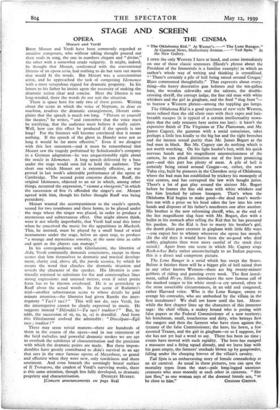STAGE AND SCREEN
OPERA
Mozart and Verdi Bum Mozart and Verdi have been commonly regarded as intuitive composers, who without taking thought poured out their souls in song, the one in numbers elegant and " divine," the other with a somewhat crude vulgarity. It might, indeed, be thought that Mozart, confronted with the conventional libretto of an opera seria, had nothing to do but turn out music that would fit the words. But Mozart was a conscientious artist, and he approached the task of composing Idomeneo with a most scrupulous regard for dramatic propriety. In his letters to his father he insists upon the necessity of making the dramatic action dear and concise. Here the libretto is too long-winded, there the words do not suit the situation.
There is space here for only two of these points. Writing about the scene in which the voice of Neptune, as dens ex machina, resolves the dramatic entanglement, Mozart com- plains that the speech is much too long. " Picture to yourself the theatre," he writes, " and remember that the voice must be terrifying, that the audience must believe it really exists. Well, how can this effect be produced if the speech is too long? For the listeners will become convinced that it means nothing. If the speech of the ghost in Hamlet were not so long it would be far more effective." Even if we disagree with this last statement—and it must be remembered that Mozart saw the tragedy performed by Schickaneder's company in a German adaptation—he was unquestionably right about the oracle in Idomeneo. A long speech delivered by a bass under the stage would soon fail to hold the audience. The short one which Mozart set is extremely effective, as was proved in last week's admirable performance of the opera at Cambridge. The second point concerns diction. Raaff, the original Idomeneo, objected to an air in which, among other things, occurred the expression, " tienmi a rinvigorir," in which the succession of five i's offended the singer's ear. Mozart agreed with him, though his father thought Raaff was being pernickety.
Mozart wanted the accompaniment to the oracle's speech, scored for two trombones and three horns, to be played under the stage where the singer was placed, in order to produce a mysterious and subterranean effect. One might almost think, were it not wholly improbable, that Verdi had read this letter when he conceived the music for the apparitions in Macbeth. This, he insisted, must be played by a small band of wind instruments under the stage, below an open trap, to produce " a strange and mysterious sonority, at the same time as calm and quiet as the players can manage."
In his correspondence with Ghislanzoni, the librettist of Aida, Verdi continually demands conciseness, except in those scenes that lent themselves to dramatic and musical develop- ment, clarity and, above all, the parole scenica, by which he means the word that clinches the dramatic situation and reveals the character of the speaker. His librettist is con- tinually enjoined to substitute for flat and commonplace lines strong expressions and unusual metres, even if strict poetic form has to be thrown overboard. He is as pernickety as Raaff about the actual words. In the scene of Radames's trial—another subterranean scene to whose details he paid minute attention—the librettist had given Ramfis the inter- rogatory " Tad ? tad ? " This will not do, says Verdi, for the interrogative cannot be clearly expressed in music. He suggests instead "Difendiri!—Tu tac i ? traditor ! " But, he adds, the succession of -ti, tu, ta, -ci is dreadful. And from this Ghislanzoni evolved the admirable : " Discolpati—Egli tace ; traditor I " These may seem trivial matters—there are hundreds of them in the course of the opera—and in our enjoyment of the bold melodies and powerful dramatic strokes we are apt to overlook the subtleties of characterisation and the precision with which the dramatic points are made. But these impon- derables have greatly contributed to Aida's survival in an age that sees in the once famous operas of Meyerbeer, so grand and effective when they were new, only tawdriness and sham sentiment. And even beneath the seemingly brutal surface of Il Trovatore, the crudest of Verdi's surviving works, there is this same attention, though less fully developed, to dramatic propriety and characterisation. DYNELEY HUSSEY.
[Concert announcements on page 8241


















































 Previous page
Previous page